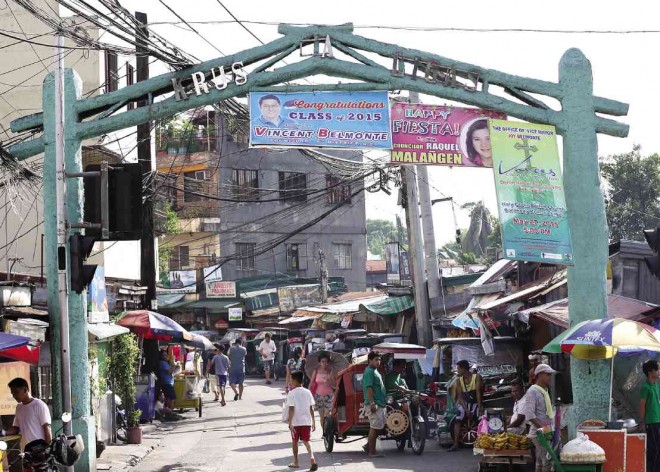
OFF-CAMPUS Barangay Krus na Ligas is part of UP property on the edge of the Diliman campus. A House bill authorizes the state university to sell lots to its longtime residents. MARIANNE BERMUDEZ
Quezon City councilors are supporting a House bill by Speaker Feliciano Belmonte Jr. to amend the charter of the University of the Philippines (UP) and allow the sale of its Krus na Ligas property to longtime residents.
“Precepts of social justice compel us to give utmost priority to extremely support the noble House Bill No. 5737 in order to fully and finally protect the rights of the people of Barangay Krus na Ligas to the land to which they have long resided,’’ said the resolution filed by 4th district Councilors Vicente Eric Belmonte, Jesus Manuel Suntay, Bayani Hipol, Jessica Daza, Raquel Malañgen and Marvin Rillo.
The bill was filed last month by the House leader and former Quezon City mayor, who is also an uncle of Councilor Belmonte. It aims to make the lots available for sale to residents who have lived in Krus na Ligas in Diliman for more than 30 years.
But it would require amending the UP Charter of 2008, which prohibits the sale of real property owned by the state university. Only land donated after the charter took effect may be disposed of by the UP Board of Regents (BOR), the university’s highest policymaking body, and only if the terms of the donation specifically allowed it.
Tadeo Palma, secretary to Mayor Herbert Bautista, said the bill hurdled the House committee on housing and urban development during a congressional hearing which he attended on Wednesday.
Like the bill, the councilors’ resolution noted the UP administration’s willingness to transfer land ownership to qualified residents. But according to Popoy de Vera, UP vice president for public affairs, the BOR has yet to tackle the Speaker’s proposal.
“UP has no position on that yet. We have to study it because there are many factors to consider and the implication is nationwide,” De Vera told the Inquirer in an earlier interview.
“There are informal settlers in other parts of the UP Diliman campus. What if they demand also that the land be given to them? Almost all UP campuses nationwide have portions of the property occupied by informal settlers,” he said.
One of the issues raised by the local government was that Krus na Ligas “is not being maximized for the city’s growth. The residents do not pay real property taxes and yet there’s significant commercial activity happening in the area and they avail themselves of city services,” De Vera said.
Palma acknowledged the tax issue but emphasized that the residents should be legitimized as land owners.
He also pointed out the need to regulate building permits. “Because it is owned by UP, we cannot come in and inspect [their homes or buildings] if they conform with the building code,” Palma said.
The case of Krus na Ligas was different from other informal settler communities on the UP campus because the village was created before UP was established, he added.